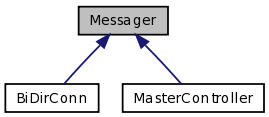Messager Class Reference
Objects that are capable of sending messages. More...
#include <messager.h>


Public Member Functions | |
| Messager () | |
| virtual | ~Messager () |
| void | add_recipient (const Messageable *) |
| Add a recipient to our recipient list. | |
| void | del_recipient (const Messageable *) |
| Remove a recipient from our recipient list. | |
| void | send_message (MessageP &) const |
| Send a message to all of our recipients. | |
Protected Types | |
| typedef std::list< Messageable * > ::iterator | recipient_iterator |
| typedef std::list< Messageable * > ::const_iterator | recipient_const_iterator |
Protected Attributes | |
| std::list< Messageable * > | recipients |
| pthread_mutex_t | recip_mutex |
| mutex to protect recipients | |
Detailed Description
Objects that are capable of sending messages.Definition at line 16 of file messager.h.
Member Typedef Documentation
typedef std::list<Messageable*>::iterator Messager::recipient_iterator [protected] |
Definition at line 42 of file messager.h.
typedef std::list<Messageable*>::const_iterator Messager::recipient_const_iterator [protected] |
Definition at line 44 of file messager.h.
Constructor & Destructor Documentation
| Messager::Messager | ( | ) |
| Messager::~Messager | ( | void | ) | [virtual] |
Member Function Documentation
| void Messager::add_recipient | ( | const Messageable * | outlet | ) |
Add a recipient to our recipient list.
Definition at line 33 of file messager.cc.
References recip_mutex, and recipients.
Referenced by Incoming::listener_thread(), main(), ConnEventHandler::operator()(), and MasterController::start_connections().

| void Messager::del_recipient | ( | const Messageable * | messageable | ) |
Remove a recipient from our recipient list.
Definition at line 47 of file messager.cc.
References recip_mutex, and recipients.
Referenced by invalidate_messageable::operator()().

| void Messager::send_message | ( | MessageP & | message | ) | const |
Send a message to all of our recipients.
Enqueue a message onto each Messageable in our recipient list.
- Parameters:
-
message The Message to send
Definition at line 60 of file messager.cc.
References Message::M_Data, recip_mutex, and recipients.
Referenced by BiDirConn::reader().

Member Data Documentation
std::list<Messageable*> Messager::recipients [protected] |
- Todo:
- The list of recipients in Messager is currently a std::list of Messageable*'s. This is atypical of the way we're handling this sort of thing now, where we're generally trying to use Loki::SmartPtr rather than standard unreferenced pointers. Is it safe to just treat all such Messageable objects as MessageableP's, and then we can dynamic_cast the contained pointer when needed to determine if it's an Outlet, or the like? This will work, becasue Messageable is a super-class of Connection, but is it the right thing to do?
Definition at line 40 of file messager.h.
Referenced by add_recipient(), del_recipient(), MasterController::destroy_children(), send_message(), and MasterController::start_connections().
pthread_mutex_t Messager::recip_mutex [protected] |
mutex to protect recipients
Definition at line 46 of file messager.h.
Referenced by add_recipient(), del_recipient(), MasterController::destroy_children(), Messager(), send_message(), and ~Messager().
The documentation for this class was generated from the following files:
- common/messager.h
- common/messager.cc
 1.5.5
1.5.5